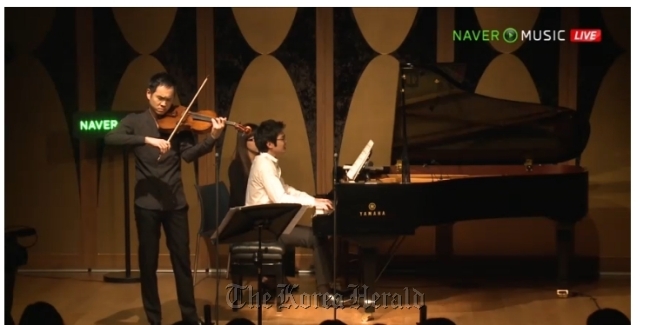When renowned violist Richard Yongjae O’Neill and pianist Lim Dong-hyek started playing on Dec. 12 at 9 p.m., it wasn’t just the some 100 people at the concert hall of NHN headquarters in Gyeonggi Province listening.
There were more than 30,000 others paying attention to Rachmaninoff, Schubert, Bach and some famous film scores through Naver, the nation’s largest portal site. The artists were performing for the Naver music section, which holds concerts on its own and broadcasts them live on the website.
It was six days before their concert at the Seoul Arts Center. While seats for the SAC performance cost up to 100,000 won each, the Naver concert was free.
There were more than 30,000 others paying attention to Rachmaninoff, Schubert, Bach and some famous film scores through Naver, the nation’s largest portal site. The artists were performing for the Naver music section, which holds concerts on its own and broadcasts them live on the website.
It was six days before their concert at the Seoul Arts Center. While seats for the SAC performance cost up to 100,000 won each, the Naver concert was free.

“I am honored to listen to such great performances at home,” wrote Marse, an Internet user, on the website.
Lee So-young a Naver PR officer said that the format could introduce people to new genres.
“It was the first time Naver had classical musicians on stage but we thought the event was meaningful because we believe that it has widened people’s access to the rather-distanced genre of music,” said Lee.
The Internet has brought people closer and opened access to many things that have been perceived impossible, or rather difficult to get into. And now it is advancing into one of the finickiest fields yet ― music.
Thanks to the rave response to Lim and O-Neill’s concert, the company is planning to stream pansori artist Lee Ja-ram’s traditional Korean style of narrative singing of “Sacheon-ga” on Friday at 8 p.m.
“We have found out that about 70 percent of access to our online concerts was made through smartphones, which are obviously used by younger people. But our projects prove that with easier access guaranteed, people will be able to enjoy unfamiliar territories of music,” Lee said. The company has already hosted 11 concerts, ranging from classical to pop, folk and rock music.
Google, through its affiliate YouTube, and other small sites are recording or streaming concerts, too. YouTube last year live streamed a K-pop concert, held near the Google headquarters in the U.S., attracting hundreds of thousands of users from around the world. Even after the concert, people can always visit the site to see the video clips any time they want.
“YouTube has been keen on the issue since it is a good way of acquiring original content, attracting visitors and enhancing its brand image,” said Park Seon-kyeong, a YouTube PR officer.
There are mixed views about the Internet becoming a new channel for music.
“Yes, I am slightly worried that it might worsen the classical music concert industry that is already staggering,” said a music critic who declined to be named. “One day, Naver, already a mogul in the industry, may try to influence the market.”
The fact that Internet broadcasting cannot guarantee good quality sound is also a concern.
“Classical music is all about the resonance and the delivery of the clean sound of the musical instruments. Whether that could be detected through the Internet is a question,” he added.
But Naver and Credia, the organizer of Lim and O’Neill’s collaboration, said they have invested a lot to securing a good sound.
“We are confident that our system is equally good or better than even broadcasting networks,” Lee said.
“I think Naver and YouTube will boost concert ticket sales. Once the audience have seen and heard live concerts they will want to visit concert halls ― that’s natural,” said Park Jae-sung, another music critic.
And for the musicians? They like it.
“Lim and O’Neill thought it was an interesting experience because they could see the comments on the website in real time,” said Kim Hyo-jin, worker at Credia.
Ryuichi Sakamoto, a Japanese classical-contemporary musician who held concert in Seoul in December last year, broadcasted his concert live on Ustream.
“I say watching my concert online will be more about sharing information, which is irresistible in modern days. But coming to the concert is more of an experience with me. The two are very different and I don’t think the concert goers should be dissatisfied with my decision,” he said in a previous interview with The Korea Herald.
By Bae Ji-sook (baejisook@heraldcorp.com)
-
Articles by Korea Herald



















